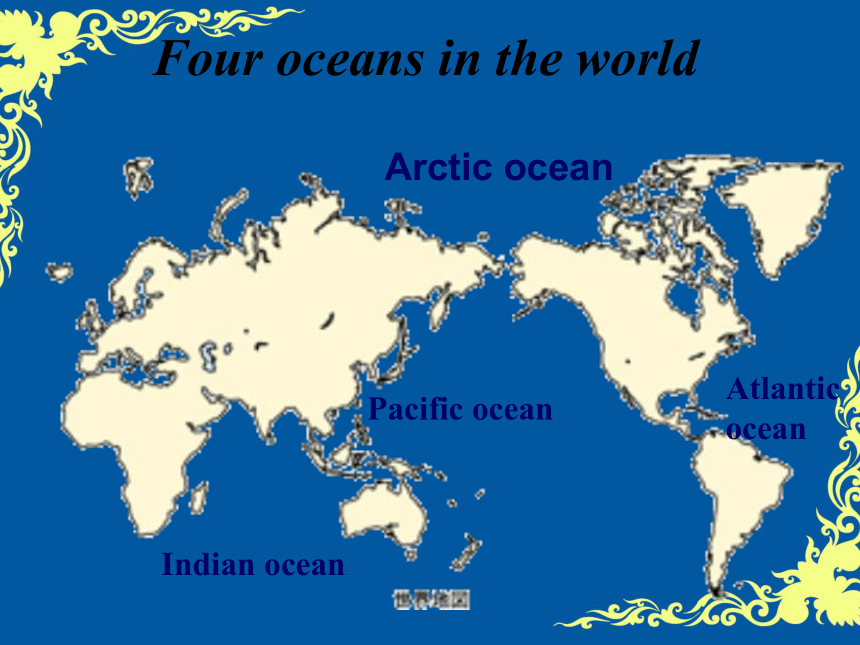(
课件网) Four oceans in the world Pacific ocean Indian ocean Arctic ocean Atlantic ocean The map of the world Latin/South/North America Lesson 43 Over the south pole pole 1.极 Pole Star 北极星 the South Pole 南极; the North Pole 北极 2.电极,磁极 3.杆;棒;柱 a flag pole flight n. 飞行 航班 Eg. All flights are cancelled because of the fog. fly v. 飞 fly --flew--flown fly n 苍蝇 explorer n. 探险家, 探测者, 探测器 explore v.探险, 探测, 探究 explore the forest ★lie 1)lie用作规则动词(lie,lied,lied)时意为“说谎”。如: ①He wasn't telling the truth. He lied again. ②She lied to us about her job. 【注意】表示这一意思时,lie可用作名词。我们一般说tell a lie或tell lies, 而不说say/talk/speak a lie(或lies)。 再如: “我痛恨说谎话”,可以说 I hate lying或I hate telling lies, 一般不说I hate lie或I hate to lie。 ★lie lie用作不规则动词(lie,lay,lain)时,表示“躺”,“(东西)平放”,“位于”等意。如: ①He's still lying in bed. ②His books lay on the desk when I went in. ③The city lies in the north of China. ④His success lay in hard work. ★lay 动词lay也是不规则动词(lay,laid,laid),是及物动词,后面必须接宾语。 表示“放置”“产卵”的意思。如: ①He laid his shoulder on my shoulder. ②Don't lay the glass on the corner of the table. ③Mother laid the baby gently on the bed. ④John laid the table. ⑤The hen is laying an egg. point point 1. n 尖端 A knife-point 2. n 点(抽象的;具体的) Many of the points in the report are correct. 3. V 指 指向 point at 指着 point to 指向 ★seem v. 似乎,看起来 seem + as if 看起来似乎…… He seems as if he had never lived in England before. seem + adj. He seems rich. seem to be He seems to be rich. seem that… 看起来似乎…… It seems that he is rich. crash v. 坠毁(从上向下掉); n. 冲突, 撞击声, 抵触 air crash 空难 car crash 车祸 His elder son was killed in a car crash a few years ago. The crash happened in thick fog. sack 袋子 购物袋 可数名词 A sack of rice This sack of potatoes weighs a hundred jin at most. clear v. 越过 (凌空、不接触地)越过, 跳过,没有接触面的飞跃 clear the mountain The horse cleared the fence. over adv. 越过(距离) go over飞跃 endless plain hopeless helpless careless Useless plain n.平原 adj 普通的 a plain girl plain water 淡水 can 和be able to 1.can和could 我们已经讲过can和could都可以表示“请求允许做某事”,can比较生硬,用于和自己同等的人或是熟悉的朋友。而could相对比较客气,显得更加礼貌,同时也反映出请求者的犹豫不决。 Can I use your telephone Could I use your telephone 2.can和be able to can和be able to都可以解释为“能够、可以”。 区别 a.在表示现在或过去的智力、体力、技能等方面的“能力”时,can、could常可与 be able to互换。 I can swim now.=I am able to swim. 我会游泳。 b. can ———能够做某事,不一定就真的做了。 be able to———是真的尝试过了,并且有能力完成这件事情。 I can swim 300 meters now and last year I was able to swim 100 meters. c. be able to 有比 can 更多的形式。从时态上来说: can做为情态动词,只有现在时和过去时。 be able to则有比can更多的 ... ...

